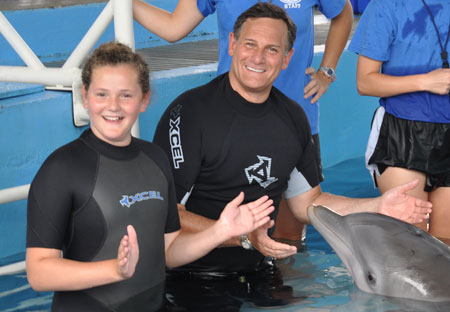Disabilities, global warming, and genocide are not easy subjects to broach with children. But when kids can become enamored with an adorable animal who serves as an ambassador for these weighty topics, it’s a conversation starter.
This is the approach that Craig Hatkoff ’76 has taken with the Turtle Pond Collection, nonfiction animal stories that he co-authors with his daughters, Juliana, 15, and Isabella, 11.
“The only job in the world harder than being a parent is being a kid, and we try to touch on issues that are about helping kids navigate a complex and sometimes dark world,” Hatkoff said.
Case in point: one of the first two books he and Juliana penned was Ladder 35, Engine 40, about Juliana’s experience coping with her feelings after Sept. 11, 2001.
When Isabella turned 6, she asked her dad if she could write a book with him, so they started looking for stories. A newspaper picture of a baby hippo snuggling with a 700-pound tortoise caught her attention, and she said, “Daddy, let’s do our story about Owen and Mzee.”
What became a 2006 New York Times number-one bestseller tells the story of how this unlikely pair became friends at an animal sanctuary after Owen, the hippo, was stranded off the shore of Kenya following the 2004 tsunami.
Owen and Mzee led the parade of animal stories that the Hatkoffs have told, followed by Knut, a polar bear, and Miza, a mountain gorilla. Knut was taken in by a Berlin zookeeper after he was abandoned by his mother.
 |
| Isabella and Craig Hatkoff ’76 are seen with Winter, a bottlenose dolphin who has a prosthetic tail and who became the subject of one of the Hatkoff’s books. |
“A baby polar bear in today’s global warming world is a powerful iconic symbol,” Hatkoff said. “We stumbled onto a new genre of children’s books: nonfiction allegory.”
Looking for Miza was Hatkoff’s project for the Clinton Global Initiative to raise awareness about the plight of mountain gorillas in the Congo.
“That was a big one because it’s about endangered species, true tragedy and trauma, and, ultimately, genocide,” he explained. “If kids learn where the Congo is and Rwanda is, you can start talking about things like that at the appropriate time. These are ways for parents, teachers, librarians, and kids to start conversations about difficult topics.”
The latest member of the Hatkoffs’ menagerie is Winter, a bottlenose dolphin. Reading Winter’s Tail, it’s easy to fall in love with the dolphin who learned to swim with a prosthetic tail after she lost her tail from entanglement in a crab trap.
“You couldn’t make up some of these stories,” Hatkoff pointed out. He and his daughters had the opportunity to meet Winter at her new home in Florida’s Clearwater Marine Aquarium, where Isabella promptly decided that she wanted to be a dolphin trainer when she grows up.
McKenna, another young girl who was touched by Winter, demonstrates the impact of these stories. She is hearing impaired and initially refused to wear her hearing aids because she was being teased.
When visiting the aquarium, “she had this epiphany that if Winter can wear her prosthetic tail, then she was going to wear her hearing aids,” Hatkoff explained.
|
With the help of Scholastic, the Turtle Pond Collection has reached children through multimedia outlets including a Nintendo DS game and interactive websites.
Scholastic even launched Winter’s Tail with a national webcast in which 500,000 students from 16,000 schools participated. “I think of these books as tools that allow kids and teachers to extend their experience. The real journey begins once you finish reading the book,” Hatkoff said. “It’s about kids becoming global citizens.”
The family has three new books coming out. Although he couldn’t reveal many details, Hatkoff did say that they will be visiting their fourth continent — Asia — and that it’s about global cooperation.
Hatkoff’s personal projects include co-founding the Tribeca Film Festival with his wife, Jane Rosenthal, and Robert De Niro, whom he met through a common friend in the late ’70s. He’s currently working on a book about technology, spirituality, and religion as his next commitment to the Clinton Global Initiative.
And at home, the Hatkoff pack includes Ruby the dog, two chinchillas, and a gerbil.
“We’ve had a peak of almost thirty pets at one time,” said the self-described animal lover. “Animals have always been a huge part of our lives, so this was all just a natural evolution.”